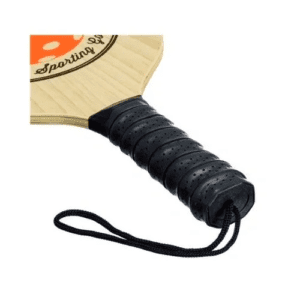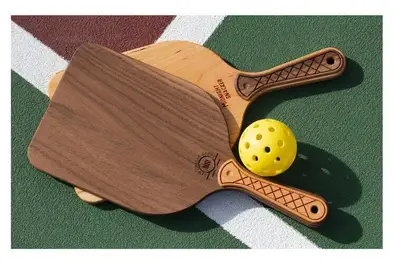Are you a fan of pickleball? Discover the appeal of wooden pickleball paddles!
When it comes to pickleball, having the right equipment is crucial. And one of the most important pieces of equipment you’ll need is a pickleball paddle. With so many options available, it can be overwhelming to choose the right one. But today, we’re going to focus on wooden pickleball paddles, a classic and popular choice among players.
So, let’s dive in and explore the benefits and drawbacks of using wooden pickleball paddles. How do they compare to other materials? Are they a good option for you? Let’s find out!
Wooden Pickleball Paddles: A Timeless Classic
Wooden pickleball paddles are not only iconic but also highly regarded by players. They offer a unique design that provides a softer feel and greater control compared to paddles made from graphite or composite materials. The time-tested designs of wooden paddles also reduce vibration and noise levels, making them a top choice for many players.
But it’s not just their performance that makes wooden pickleball paddles stand out. They also have a distinct aesthetic appeal, with beautiful wood grains often seen on tournament courts worldwide. If you’re looking for a paddle that combines functionality with visual appeal, a wooden paddle should be at the top of your list!
Wooden Pickleball Paddles: Durability at Its Finest
One of the main advantages of wooden pickleball paddles is their durability. They are extremely sturdy and long-lasting, outperforming paddles made from other materials. They can handle rough surfaces and impacts better, making them an excellent choice for players who are hard on their equipment.
While wooden paddles are less likely to crack or warp due to temperature changes or humidity, they can still get scratched or dented over time. To protect them, it’s best to store your wooden paddle in a protective case when not in use and avoid exposing it to direct sunlight or moisture for extended periods.

Weight: A Factor to Consider
When choosing a pickleball paddle, weight plays a significant role in your performance. Wooden paddles tend to be heavier than other materials, weighing approximately 10 to 12 ounces. This extra weight can make them more challenging to swing and control, especially for beginners or players with weaker wrists or arms. However, some players prefer the added weight as it provides a more solid and balanced feel.
Why Do Pickleball Paddles Have Holes?
If you’ve ever wondered why pickleball paddles have holes, here are some primary reasons:
- To reduce the paddle’s weight, as wood is heavier than other materials. The holes make the paddle easier to swing and maneuver.
- To increase the paddle’s surface area, allowing players to get more spin and control over their shots. The holes create more friction and contact with the ball, affecting its trajectory and speed.
- To reduce wind resistance and drag, improving paddle speed and accuracy. The holes allow air to flow through the paddle, making it more aerodynamic and stable.
However, not all pickleball paddles have holes. Solid paddles, made from wood or composite materials, are typically smoother and quieter than perforated paddles. According to official rules, the paddle’s hitting surface should be smooth, flat, and rigid.
The Pros and Cons of Wooden Paddles

Wooden pickleball paddles have both advantages and disadvantages that make them suitable for certain players:
Advantages
- Cost-effective and affordable, ranging from $10 to $30.
- Durable and resistant to scratches and wear.
- Offer more power and control due to their hardness and stiffness.
Disadvantages
- Heavy and can weigh up to 12 ounces, making them harder to swing and maneuver.
- Noisy and can produce a loud sound when hitting the ball.
- Less spin and touch compared to other paddles.
Ultimately, the best paddle for you depends on your playing style and preferences!
FAQs
Can you play pickleball with wooden paddles?
Yes, you can! Wooden paddles are a traditional choice in pickleball and offer reasonable control when striking the ball. However, some players prefer graphite racquets for their lighter weight and increased reaction time. Ultimately, it’s up to you to choose a paddle that suits your playing style.
Can a pickleball paddle have a rough surface?
Yes, it can. Many players choose paddles with a rough finish as it provides more control over the ball and makes it easier to spin. However, it’s crucial to find the right balance – a surface that’s too rough can make it difficult to hit the ball with the desired force.
Can you carry pickleball paddles?
Absolutely! Most airlines allow passengers to bring sports equipment, including pickleball paddles, onboard. However, it’s always a good idea to check with your airline beforehand for any specific size and weight requirements.
Wrap Up!
Wooden pickleball paddles are a fantastic option for beginner and intermediate players seeking a durable, powerful, and budget-friendly paddle. They offer a classic feel and sound that many players enjoy. However, if you’re an advanced player looking for more control, spin, and maneuverability, there are better options available in the market.
We hope this article has provided you with valuable insights into wooden pickleball paddles and helped you determine if they suit your needs. Happy pickleballing!



